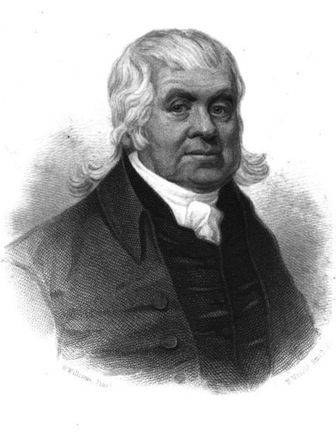MAGLJMurray
JOHN MURRAY 1741-1815

- MM before 1800, Rising States
- Affiliated by 1805, Columbian
- Grand Chaplain 1803, 1806-1810
BIOGRAPHY
From Proceedings, Page 1873-201:
REV. JOHN MURRAY, BOSTON, Universalist. 1805-07, 1809-10.
REV. JOHN MURRAY was the first pastor of the first Universalist Society in Boston, over which he was settled in 1793. He had the reputation of having been the first preacher in America of the doctrines peculiar to his sect. He was born in England, December 10, 1741, and came to this country in 1770. He served as chaplain in the American army, in the war of the Revolution. In the month of May, 1775, the leading officers of the Rhode Island Brigade, assembled in the neighborhood of Boston, despatched a respectable messenger with a letter soliciting the attendance of the Promulgator as chaplain to their detachment of the Revolutionary Army." Severe sickness did not permit him to remain long in the service, but while in it, Gen. Washington honored him "with marked and uniform attention." As a Mason, Brother Murray was devoted and zealous. He officiated one or more terms as Grand Chaplain of the Grand Lodge of Massachusetts. He died in Boston, Sept. 3, 1815. —History of Columbian Lodge, 1856.
The records of Columbian Lodge furnish the following: — "At a special meeting of Columbian Lodge, June 24, 1800, for the purpose of dedicating Masons' Hall (on Ann street), Bro. Murray made a prayer adapted to the subject, and Rev. Bro. Harris delivered an address on the occasion.
— See History of C. L.
The biographies by Allen and Drake are referred to for further information. "Mr. John Murray, a native of England, who arrived in America before the commencement of the Revolutionary War, had preached in New Jersey, in Philadelphia and New York, some time previous to his coming into New England. . . The life of Mr. Murray having been published since his death, and circulated considerably among our societies, it will be the less necessary to enter very minutely into his history. We shall do no more, in this place, than merely sketch A brief outline of his character as an early laborer in the vineyard of the Lord, and a firm and undaunted soldier, enduring hardness in the cause of the Captain of our salvation.
In point of doctrine, Mr. Murray was really and professedly a disciple of Mr. Kelley, whose peculiar views of the Gospel need not be detailed here, as they were explained at large in the department of this work to which they properly belong. In the manner of his preaching, Mr. Murray was always greatly interesting and could command the most profound attention in the greatest audiences. It has been often said that Mr. Whitefield was his model, and it is not unlikely that, from his intercourse with that gentleman in early life, having been a member of his communion, and from the regard and reverence he bore to him, he might, without intention, have copied his manner in proportion as he imbibed his spirit. He was powerful, yet cold and dispassionate in argument. He possessed a vast acquaintance with the Scriptures; and few men could apply with so much ease and readiness their figurative expressions, to illustrate the great doctrine of the Gospel. To a fervid imagination and a vigorous intellect, he had in addition a strong and retentive memory, which had ever been much exercised. He had read many theological works, the principal features of which he always distinctly recollected; and he could, frequently, when quoting an author in public, give his ideas in his own words. It has been sometimes urged against Mr. Murray that he indulged too much in a spirit of sarcasm and satiric wit. That he possessed these powers is well known, and that, at certain times, he employed them is not denied.
We believe, however, that in the later periods of his life he sincerely regretted his use of those powers in his public character. To the writer of this article he once said, "If you possess wit, if you have a talent for satire, never cultivate, never indulge in them. They will not produce you any sincere friends; they will make you many enemies. It is no way to catch birds, by casting stones at them." Mr. Murray was a chaplain in the American Army during a great part of the Revolution, and for a considerable time attached to the family of Gen. Washington,
His first establishment in the ministry was at Gloucester, on Cape Ann; the next and last, at Boston, where a large and respectable society had been gathered by his instrumentality. He continued to labor with them in word and doctrine constantly, with the exception of visiting, once in a few years, Philadelphia, Baltimore, New York, etc., in which places he had numerous friends, until the autumn of 1809, when he was seized with a paralysis which interrupted his regular labors; and except in a few instances, when he was carried into the pulpit, he never preached more. Still his mental powers were not so much impaired as we should have expected from his age and the nature of his disease; and in his protracted hours of pain and languor, we have often been struck with admiration at that force of genius and activity of mind which he continued to exhibit. The faith which he had so long preached to others was his spiritual support under all his infirmities; and on the 3d of September, 1815, he quietly departed this life, in the "hope, full of immortality." Thus died one who, when our country was morally a wilderness, "went forth weeping, yet bearing precious seed," and lived to see that seed spring up and flourish, and to " return again rejoicing, and bringing his sheaves with him."
— Note on pp. 167, 168 Universalist Quarterly, 1871.